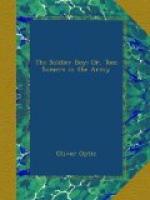The next day the Pinchbrook boys were designated as Company K, and placed in the regimental line. The limits of this volume do not permit me to detail the every-day life of the soldier boy while at Fort Warren, however interesting and instructive it might be to our friends. A large portion of the forenoon was devoted to squad and company drill, and of the afternoon to battalion drill. The colonel, though a very diminutive man in stature, was an enthusiast in military matters, and had the reputation of being one of the most thorough and skilful officers in the state. Tom Somers, who, since he joined the company, had felt ashamed of himself because he was no bigger, became quite reconciled to his low corporeal estate when he found that the colonel of the regiment was no taller and no heavier than himself. And when he heard the high praise bestowed upon the colonel’s military skill and martial energy, he came to the conclusion that it does not require a big man to make a good soldier. With a feeling of satisfaction he recalled the fact that Napoleon Bonaparte, when he commanded the army of Italy, was scarcely a bigger man than the colonel or himself.
The colonel was a strict disciplinarian, and he soon diffused his energy throughout the regiment. It made rapid progress in its military education. Tom was deeply interested in the details of his new profession, and used his best endeavors to do his duty promptly and faithfully. This was not the case with all the boys in the company from Pinchbrook, and I am sorry to say that some of them, including the brave and chivalric Ben Lethbridge, had to sit upon the stool of repentance in the guard room on several occasions.
Fred Pemberton was clothed in the uniform of the United States volunteers, and we must do him the justice to say that he performed his duty to the entire satisfaction of his officers. Fred was a good fellow, and barring his treason, which he had derived from his father, was highly esteemed by those who knew him. The only stain that had ever rested upon his character was removed, and he and Tom were as good friends as ever they had been. His motive in joining the army, however, could not be applauded. He thought all his friends were going off to the South upon a kind of frolic, spiced with a little of peril and hardship to make it the more exciting, and he did not like the idea of being left behind. To the sentiment of patriotism, as developed in the soul of Tom Somers and many of his companions, he was an entire stranger. He was going to the war to participate in the adventures of the —th regiment, rather than to fight for the flag which had been insulted and dishonored by treason.
Every day the steamers brought crowds of visitors to the fort to see their friends in the regiments quartered there, or to witness the drills and parades which were constantly succeeding each other. Among them came many of the people of Pinchbrook, and Tom was delighted by a visit from his whole family. His mother found him so comfortable and contented that she returned with half the heavy burden on her soul removed.




